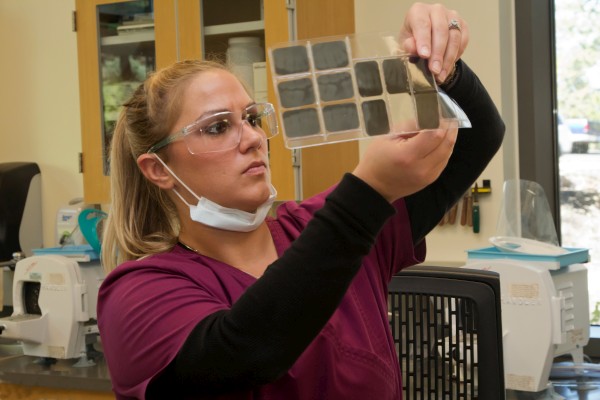Dental Certificate Opens Up Rewarding Career
COCC’s dental assisting program emphasizes hands-on learning, people skills
Getting smiles back on track is the mission of a low-cost dental clinic staged at
Central Oregon Community College’s (COCC) Health Careers Center every other Friday. Local dentists volunteer their time to see patients (appointments
are made in advance; see below), a nominal fee covers the cost of supplies, and folks
dealing with deferred dental work can find the relief they need.
But this valuable community resource serves another purpose as well—putting COCC’s dental assistant students in the ultimate hands-on learning environment.
The facility, complete with eight operatories and the latest technologies, mimics a dental practice in feel and scope, and it helps elevate the learning experience. Students grow skills and confidence through the person-to-person nature of the clinic and a working relationship with dentists.
This level of training, combined with top-notch instruction and internship know-how, keeps grads of the one-year Dental Assisting certificate—which starts every fall and concludes in the spring—in high demand. “Our assistants are very successful and the dentists clamor for them,” said Lynn Murray, program director.
The role of a dental assistant is different from a hygienist. While assistants work closely with dentists during procedures, they also perform many lab duties. Assistants take impressions and make retainers, crowns, models and bleach trays. They handle X-rays and sterilize instruments. They create treatment plans. Some work in reception, setting up appointments and managing patient records. Fundamental to their interactions with patients is helping describe and interpret procedures, somewhat like a guide on a trip to a foreign land.
The facility, complete with eight operatories and the latest technologies, mimics a dental practice in feel and scope, and it helps elevate the learning experience. Students grow skills and confidence through the person-to-person nature of the clinic and a working relationship with dentists.
“You have to be a really good communicator,” said Deb Davies, professor of Dental Assisting and department chair of the college’s health programs. “We can teach you all the other necessary skills, but being a good communicator and team player are critical.”
The training itself is a full course load, covering topics like dental materials and dental computing, and it factors in two practicums—300 hours’ worth—in area dental offices. Typically, students take two terms to complete the program’s prerequisite classes, added Davies. These are required before proceeding with the certificate; credits mandated by the Commission on Dental Accreditation include classes in composition, algebra and psychology.
Each annual cohort is limited to 24 students. The size ensures excellent personal attention and instructor interaction. And once in the workforce, grads find good earning potential and a career built around improving lives.
“My job is very fast-paced,” said Evelyn Vangrunsven, a 2015 graduate, who appreciated the role that internships played in the program. “I was immediately hired on with Advantage Dental,” she said. “I’m very happy with my career decision.”
“Every day is different,” said Vanessa Mendez, who also graduated in 2015 and is employed at Rimrock Dental in Redmond. Mendez’s days involve everything from assisting with procedures to lab work to ordering supplies. “I enjoy building relationships with the patients and giving each one a sense of ease and comfort when they’re in the chair. They leave with confidence in their smile…that truly is valuable.”
For some, dental assisting might lead to other focuses in the field. A number of graduates have gone on to earn a hygienist degree. Bree Alexander of Prineville, who graduated in 2017, is currently pursuing her bachelor’s degree in dental hygiene at Pacific University. “From a career standpoint, the COCC program allowed me the opportunity to comprehensively experience all that the dental field has to offer,” she said. “I really enjoyed and respected the cultivating learning environment.”
Another grad, inspired by her early dental training and experiences at COCC, recently earned her DMD. Additional career possibilities include working as a dental instructor or as a lab tech.
“This is a great, quick, effective and successful program that will allow you to build an outstanding career,” Mendez said of dental assisting. “You won’t look back and will be grateful you did it.”
Learn more about this and other COCC healthcare programs at an information session. For more information on the college, visit cocc.edu or call 541-383-7700.
The dental clinic is for low-income individuals and held during the academic year. Contact Deschutes County Health Services at 541-322-7400 to learn more.
By Mark Russell Johnson, COCC College Relations

